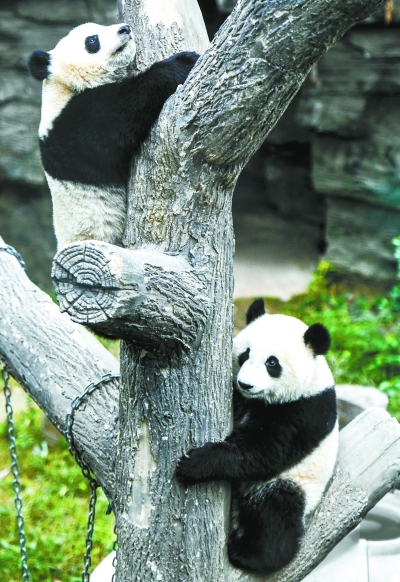
Twin giant pandas "Mengbao" and "Mengyu" are playing in the museum. Reporter Deng Wei photo
Beijing Daily News (Reporter Ye Xiaoyan) Since yesterday, two new members have been added to the Giant Panda Pavilion in Beijing Zoo. The twin sisters "Meng Bao" and "Meng Yu" born in Chengdu, Sichuan officially moved into the Giant Panda Olympic Pavilion. At this point, the Giant Panda Pavilion in Beijing Zoo has made up the "Top Ten Generals".
Yesterday morning, two twin giant pandas, one year old and five months old, made their official appearance in the middle exhibition hall of the Olympic Hall of the Giant Panda Pavilion in Beijing Zoo. As they were still adapting to the surrounding environment shortly after staying in the independent room, they tried to climb in the indoor playground for a while, and then picked up bamboo to taste it.
The two giant pandas, named Mengbao and Mengyu, were born in Sichuan on May 23, 2018. They are twin "sister flowers". "Like humans, the breeding of giant pandas should also pay attention to the adjustment of blood relationship." The relevant person in charge of Beijing Zoo told the reporter that in order to adjust the consanguinity of giant pandas and maintain the genetic diversity of the population, Beijing Zoo and Sichuan chengdu research base of giant panda have been carrying out cooperative breeding projects for giant pandas for many years.
The father of Mengbao and Mengyu is Meilan, and the mother is MengMeng. This pair of giant panda couples is well-known, so when the twins were born, they attracted much attention from all walks of life. The two giant pandas weighed only 149.2g and 110.7g at birth. After a year and five months of growth, they have now grown to 40.5 kg and 39 kg.
After their birth, the twins lived with their mother "MengMeng" in Chengdu, Sichuan. "Generally, panda cubs will learn to eat bamboo when they are five months old. In six months, they will grow 20 teeth, including canine teeth, incisors and premolars, and begin to formally chew bamboo leaves. Giant pandas in captivity will wean at the age of six months to one and a half years old." The staff introduced.
With the gradual growth of twin sisters, under the premise that all conditions are suitable, Beijing Zoo negotiated with chengdu research base of giant panda, Sichuan, and took two giant pandas to Beijing on September 10th. "Just like weaning a child, we should choose the right time. The reason why I chose to come to Beijing in September was because the weather in Beijing at that time was more suitable and the bamboo varieties that I could provide were also rich. " The staff said.
Changqing Li is an experienced giant panda keeper in Beijing Zoo. At the beginning of September this year, he was sent to the base to live with the twins for half a month, in order to make the twins adapt to the keepers and feeding methods in advance. On September 10th, the twin giant pandas flew from Sichuan to Beijing Zoo, and stayed in the quarantine yard for one month.
During the quarantine period, Changqing Li remained their keeper, feeding and training at the quarantine yard every day, and observing the twins’ every move. At the same time, veterinarians also pay close attention to the physical conditions of Mengbao and Mengyu, and conduct regular deworming and observation to ensure the health of the two giant panda cubs during the quarantine period. Now, after a month of strict quarantine, the twins have adapted to the environment in Beijing. "Generally, giant pandas live independently, but the two sisters have lived together since childhood, so they live together temporarily and then raise them separately when they are older." Changqing Li said.
Up to now, the total number of giant pandas living in Beijing Zoo has reached 10. They are Dadi, Jini, Gugu, Mengda, Menger, Menglan, Diandian, Fuxing, Mengbao and Mengyu, and the parents of three giant pandas are also Mengda, Menger and Menglan. Five giant pandas, Fuxing, Menglan, Diandian, Mengbao and Mengyu, meet the tourists in turn.
In order to make the pandas live more comfortably, the breeders have also taken great pains. They not only added green plants to the indoor sports ground, but also added "amusement facilities" such as rocking chairs and perches to the outdoor sports ground, and also adjusted the position of placing bamboo to enhance the panda’s feeding pleasure. Feed mix is also particular. The breeder will adjust the food mix according to the individual needs of each giant panda, and raise it scientifically and accompany it attentively.
关于作者